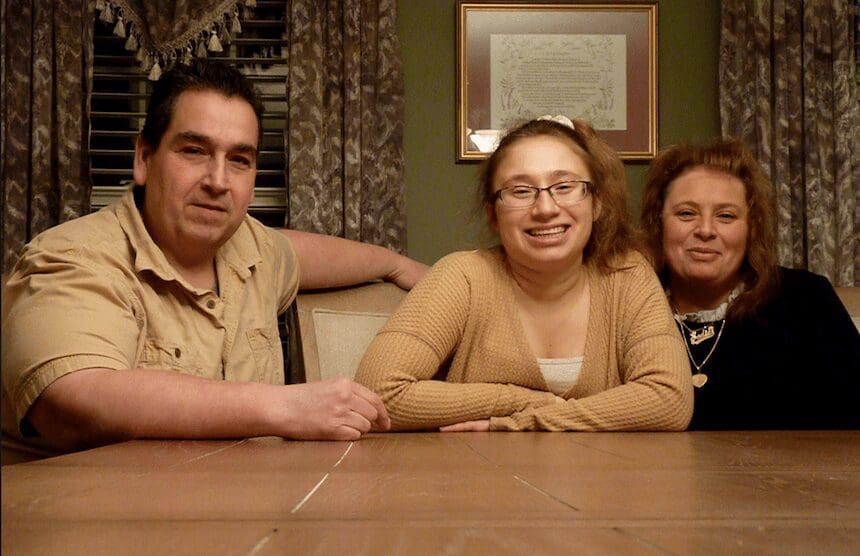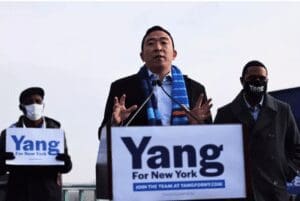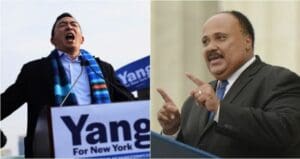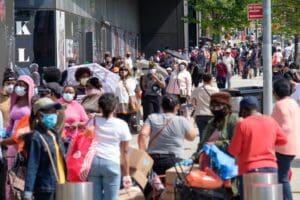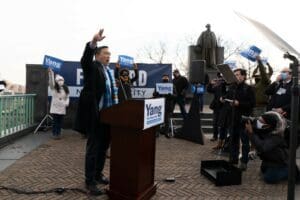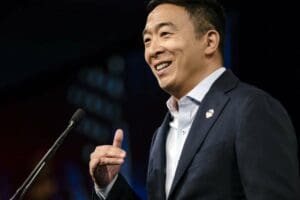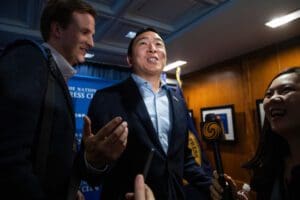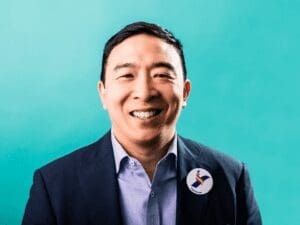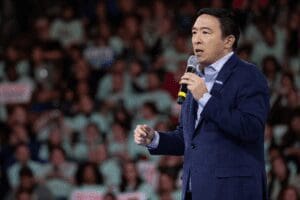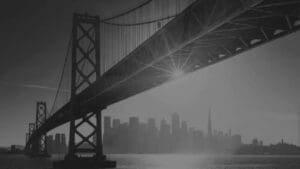How would an extra $12,000 a year change your lifestyle? Your life? The centerpiece of Andrew Yang’s presidential campaign is something he dubs the Freedom Dividend: a payment of $1,000, every month, to every adult in America.
Outside of some small-scale trials, universal basic incomes like the Freedom Dividend don’t have much proof of concept.
So for 2019, Yang decided to fund a test case out of his own pocket, and selected the Fassi family of Goffstown, N.H.
After twelve months, we checked in with them to see how the money changed their habits, and even their health.
“You know, if people aren’t living in this scarcity, then maybe it will turn, maybe, the mental health of this country around a little bit.”
The Fassi family is Chuck, Jodie, their college-aged daughter Janelle, and a dog that nips at reporters.
They define themselves as middle class. “Maybe on the lower rung, not necessarily towards the upper,” as Chuck puts it.
There’s a history of mental illness on Chuck’s side, and he’s struggled at times. In 2017, he lost a decent-paying job with a chemical dispensing company.
“And then he had, like, a breakdown because he couldn’t understand what happened to him,” said Jodie. “And what we were going to do now for money? He couldn’t handle it, so he went into the hospital for a week.”
“You got a daughter in college, you don’t have an income, you have bills coming in, no livelihood to pay them, and it does a lot to your psyche,” Chuck said. “It makes you feel less of a, not even, a human being.
The family sold off Chuck’s Camaro. They cut back on unnecessary spending. Jodie, who cleans houses, even suspended their public radio contributions, if you can believe that.
Then in the fall of 2018, just as Chuck landed a new job, albeit one with a significant pay cut, Janelle saw Andrew Yang give a speech in Keene. Yang told the audience he was looking for a family who could serve as a model for his Freedom Dividend program.
“I didn’t know who Andrew Yang was when Janelle came to us, saying, ‘Hey, there is this Asian guy running for president, and he wants to give everybody $1,000 a month, and he wants to start with you.’ I’m like, ‘okay,’ ” Chuck said.
The concept of a Universal Basic Income has had a range of backers over the years, from Thomas Paine in the 18th century, to free-market economist Milton Friedman and civil rights activist Dr. Martin Luther King, Jr.
Under Yang’s plan, everyone over 18 would qualify for the dividend. To implement the policy on a nationwide scale, he estimates a price tag close to $3 trillion a year. Yang is proposing to pay for that with a Value Added Tax, which is common in Europe.
Putting aside whether this is smart policy, or even feasible – and plenty of people don’t think it is – the Fassi family was intended to serve as an isolated experiment in free money carried out in the thick of the 2020 race.
After interviewing them, Yang handed Jodie the first check of 12 checks for $1,000 on New Years Eve of 2018.
“So we just kept putting it in the bank, and then when Janelle, of course, when her tuition came, it was very relaxing knowing I had that money,” said Jodie.
Of the $12,000 they received during 2019, the Fassis estimate they put about $10,000 toward college. That’s money Janelle now won’t have to borrow in loans.
The Fassis don’t have receipts for how they spent the other $2,000, but they do recognize ways – small ways – that the UBI changed their spending habits.
“Even going to the grocery store. You know, without thinking, ‘Oh, we want that, we want that,’ ” said Jodie.
Organic peanut butter. Kale. Top shelf yogurts, and even a few bulk-sized bottles of kombucha.
“Chucky would sneak that in the grocery cart anytime we were at the grocery store,” said Jodie. “And I kept saying, okay, when this money stops, this is going to stop. Because $8, $9 for one bottle, we can’t afford that.”
The Freedom Dividend also prompted Chuck to try something he heard could be good for people with anxiety.
“I actually started taking improv classes for my mental health, and that was $100 a month,” he said. “We noticed that we were doing things that we normally, if we weren’t receiving it, we weren’t going to do.”
So, with an extra $12,000, the Fassi family chose college tuition, fancy yogurt and improv classes. It’s easy to imagine other middle class families doing something similar: a mix of the financially prudent, with some extra set aside for the things that make life worth living.
It’s exactly what Andrew Yang has in mind.
“I think Chuck even worked on some kombucha and home crafts, so there are many things that were very positive with the Freedom Dividend,” Yang told NHPR last week after a rally in Concord. “And this is the trickle up economy, and the Fassi family demonstrates just how positive it can be.”
One of Yang’s arguments for UBI is that it would provide a boost: not just a financial one, but a mental one, to all of America.
Chuck agrees.
“You know, if people aren’t living in this scarcity, then maybe it will turn, maybe, the mental health of this country around a little bit,” he said.
After a year of free money, the Fassis aren’t exactly returning to scarcity. They are dialing their spending back, though. Less kale, and a daunting college tuition bill on the way. The financial freedom of the last 12 months is all gone. To them, well spent.










